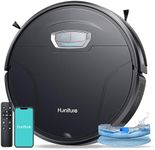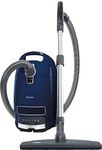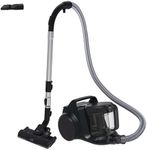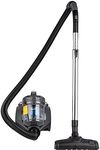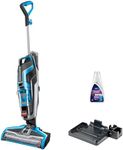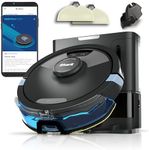Buying Guide for the Best Hard Floor Vacuums
Choosing the right hard-floor vacuum can make a significant difference in maintaining the cleanliness and longevity of your floors. When selecting a vacuum, it's important to consider various specifications that will determine how well the vacuum performs on hard surfaces. Understanding these key specs will help you make an informed decision and find the best fit for your needs.Suction PowerSuction power is a measure of how effectively a vacuum can pick up dirt and debris. This is particularly important for hard floors, as strong suction ensures that even fine dust and small particles are removed. Suction power is often measured in watts or air watts. For hard floors, a vacuum with moderate to high suction power is ideal. If you have a lot of foot traffic or pets, opt for higher suction power to ensure thorough cleaning.
Filtration SystemThe filtration system in a vacuum determines how well it can trap dust and allergens. This is crucial for maintaining indoor air quality, especially if you have allergies or asthma. HEPA (High-Efficiency Particulate Air) filters are the gold standard, capturing 99.97% of particles as small as 0.3 microns. If air quality is a concern, look for vacuums with HEPA filters. For general use, a vacuum with a good multi-stage filtration system should suffice.
Weight and ManeuverabilityWeight and maneuverability affect how easy it is to use the vacuum, especially if you need to carry it up and down stairs or navigate around furniture. Lightweight vacuums are easier to handle and less tiring to use. For hard floors, a vacuum that is easy to maneuver will help you clean more efficiently. If you have a large area to cover or multiple levels, consider a lightweight model with swivel steering for better control.
Brush Roll TypeThe brush roll type is important because it determines how well the vacuum can clean different surfaces. For hard floors, a vacuum with a soft brush roll or a brush roll that can be turned off is ideal to prevent scratching and ensure effective cleaning. Some vacuums come with specialized hard floor attachments that are designed to pick up fine dust without damaging the surface. If you have delicate flooring, prioritize vacuums with these features.
Noise LevelThe noise level of a vacuum can impact your comfort while cleaning, especially if you have young children, pets, or sensitive hearing. Noise levels are measured in decibels (dB). Quieter vacuums typically operate at around 60-65 dB, while louder models can exceed 70 dB. If noise is a concern, look for vacuums that are specifically designed to operate quietly. For general use, a vacuum with a moderate noise level should be acceptable.
Corded vs. CordlessCorded vacuums offer consistent power and are ideal for long cleaning sessions, while cordless vacuums provide greater mobility and convenience, especially for quick clean-ups. Cordless models are powered by batteries, so consider the battery life and charging time. If you have a large area to clean, a corded vacuum might be more practical. For smaller spaces or quick, frequent cleaning, a cordless vacuum can be very convenient.
Dustbin CapacityThe dustbin capacity determines how much dirt and debris the vacuum can hold before it needs to be emptied. Larger capacities mean less frequent emptying, which is convenient for larger homes or extensive cleaning sessions. For hard floors, a moderate to large dustbin capacity is usually sufficient. If you prefer not to empty the bin frequently, look for vacuums with larger capacities. For smaller spaces, a smaller dustbin may be adequate.



